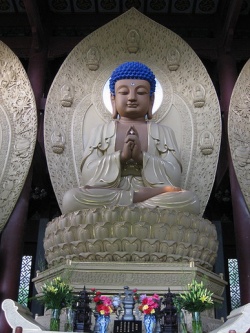Mahā Parinibbāna Sutta
Maha-parinibbana Sutta (Last Days of the Buddha)
The Maha-parinibbana Sutta was given near the end of the Buddha's life. In this sutta, the Buddha emphasized the importance of the four noble truths with the following statement:
And the Blessed One addressed the bhikkhus, saying: "Bhikkhus, it is through not realizing, through not penetrating the Four Noble Truths that this long course of birth and death has been passed through and undergone by me as well as by you. What are these four? They are the noble truth of suffering; the noble truth of the origin of suffering; the noble truth of the cessation of suffering; and the noble truth of the way to the cessation of suffering. But now, bhikkhus, that these have been realized and penetrated, cut off is the craving for existence, destroyed is that which leads to renewed becoming, and there is no fresh becoming."
Thus it was said by the Blessed One. And the Happy One, the Master, further said:
Through not seeing the Four Noble Truths,
Long was the weary path from birth to birth.
When these are known, removed is rebirth's cause,
The root of sorrow plucked; then ends rebirth.
Last Days of the Buddha
The Blessed One's Deadly Sickness
27. At that time the Blessed One spoke to the bhikkhus, saying: "Go now, bhikkhus, and seek shelter anywhere in the neighborhood of Vesali where you are welcome, among acquaintances and friends, and there spend the rainy season. As for me, I shall spend the rainy season in this very place, in the village of Beluva."
"So be it, O Lord," the bhikkhus said.
28. But when the Blessed One had entered upon the rainy season, there arose in him a severe illness, and sharp and deadly pains came upon him. And the Blessed One endured them mindfully, clearly comprehending and unperturbed.
29. Then it occurred to the Blessed One: "It would not be fitting if I came to my final passing away without addressing those who attended on me, without taking leave of the community of bhikkhus. Then let me suppress this illness by strength of will, resolve to maintain the life process, and live on."
30. And the Blessed One suppressed the illness by strength of will, resolved to maintain the life process, and lived on. So it came about that the Blessed One's illness was allayed.
31. And the Blessed One recovered from that illness; and soon after his recovery he came out from his dwelling place and sat down in the shade of the building, on a seat prepared for him. Then the Venerable Ananda approached the Blessed One, respectfully greeted him, and sitting down at one side, he spoke to the Blessed One, saying: "Fortunate it is for me, O Lord, to see the Blessed One at ease again! Fortunate it is for me, O Lord, to see the Blessed One recovered! For truly, Lord, when I saw the Blessed One's sickness it was as though my own body became weak as a creeper, every
thing around became dim to me, and my senses failed me. Yet, Lord, I still had some little comfort in the thought that the Blessed One would not come to his final passing away until he had given some last instructions respecting the community of bhikkhus."
32. Thus spoke the Venerable Ananda, but the Blessed One answered him, saying: "What more does the community of bhikkhus expect from me, Ananda? I have set forth the Dhamma without making any distinction of esoteric and exoteric doctrine; there is nothing, Ananda, with regard to the teachings that the Tathagata holds to the last with the closed fist of a teacher who keeps some things back. Whosoever may think that it is he who should lead the community of bhikkhus, or
that the community depends upon him, it is such a one that would have to give last instructions respecting them. But, Ananda, the Tathagata has no such idea as that it is he who should lead the community of bhikkhus, or that the community depends upon him. So what instructions should he have to give respecting the community of bhikkhus?
"Now I am frail, Ananda, old, aged, far gone in years. This is my eightieth year, and my life is spent. Even as an old cart, Ananda, is held together with much difficulty, so the body of the Tathagata is kept going only with supports. It is, Ananda, only when the Tathagata, disregarding external objects, with the cessation of certain feelings, attains to and abides in the signless concentration of mind, that his body is more comfortable.
33. "Therefore, Ananda, be islands unto yourselves, refuges unto yourselves, seeking no external refuge; with the Dhamma as your island, the Dhamma as your refuge, seeking no other refuge.
"And how, Ananda, is a bhikkhu an island unto himself, a refuge unto himself, seeking no external refuge; with the Dhamma as his island, the Dhamma as his refuge, seeking no other refuge?
34. "When he dwells contemplating the body in the body, earnestly, clearly comprehending, and mindfully, after having overcome desire and sorrow in regard to the world; when he dwells contemplating feelings in feelings, the mind in the mind, and mental objects in mental objects, earnestly, clearly comprehending, and mindfully, after having overcome desire and sorrow in regard to the world, then, truly, he is an island unto himself, a refuge unto himself, seeking no external
refuge; having the Dhamma as his island, the Dhamma as his refuge, seeking no other refuge.
35. "Those bhikkhus of mine, Ananda, who now or after I am gone, abide as an island unto themselves, as a refuge unto themselves, seeking no other refuge; having the Dhamma as their island and refuge, seeking no other refuge: it is they who will become the highest, if they have the desire to learn."
